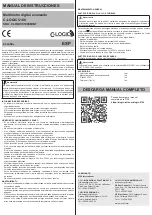
363-206-204
Release 13 (TARP) Installation Tests
Issue 9 October 1998 9-17
2. To verify correct fiber connection to the first site, do one of the following:
3. Remote login to the first site and check for the following alarm (other
alarms may exist) to verify proper fiber connection:
MINOR main-2 ------------- inc.OC3 LOS
4. Locally verify main-2 is flashing, indicating loss of incoming signal.
5. Correct fiber connections if alarms are not as specified. Reconnect the
fiber at the first site Main-1 Out and observe that alarms discussed above
are clear.
NOTE
:
VT AIS alarms due to cross-connections remaining from Local and DSX-1
cross-connect tests may be observed. Ignore them at this time.
6. Continue at the first site by disconnecting OLIU M2 Out and observing
alarms as described previously, but in accordance with the fiber discon-
nected.
7. Continue around the ring until all fiber has been tested.
Establishing Cross-Connects and
System Test
Description
On initial installation/turn-up of Release 13 systems there are no default cross-
connects, thus all cross-connects need to be entered. In Release 13, DS1 or DS3
services and EC-1 interfaces are provided and thus VT and STS-1 cross-connects
are applicable.
Due to the flexibility and complexity of cross-connects it is strongly recommended
to document the cross-connects of each site and have a compilation located at
each site. Therefore in the event the cross-connect map is lost, cross-connects
can be reestablished expeditiously.
Explanation of Cross-Connects
For DS1 service one can imagine 84 race tracks (timeslots/channels) around the
ring. Travel (transmission) takes place in both directions (receiving end chooses
best signal). Each track requires two "drop cross-connects" to enter/exit the track.
All other points on the ring require a "pass-through" cross-connect.
Release 13 software is a two fiber path-switched ring. Each VT or STS1 (DS1 or
DS3 signal) is transmitted in both directions (clockwise and counter-clockwise)
around the ring. The receiver monitors the signal from both directions and selects
the "best" one. This receiver will select the signal from the incoming fiber on OLIU
Summary of Contents for DDM-2000 OC-3
Page 4: ...Issue 9 October 1998 363 206 204 Lucent Technologies ...
Page 9: ...363 206 204 Issue 9 October 1998 Lucent Technologies ...
Page 10: ...Issue 9 October 1998 363 206 204 Lucent Technologies ...
Page 24: ...xxiv Issue 9 October 1998 363 206 204 ...
Page 32: ...xxxii Issue 9 October 1998 363 206 204 ...
Page 34: ...xxxiv Issue 9 October 1998 363 206 204 ...
Page 58: ...1 ii Issue 9 October 1998 363 206 204 ...
Page 74: ...2 iv Issue 9 October 1998 363 206 204 ...
Page 144: ...2 70 Issue 9 October 1998 363 206 204 Equipment and Rear Access Cable Installation ...
Page 192: ...3 46 Issue 9 October 1998 363 206 204 Equipment and Front Access Cable Installation ...
Page 304: ...6 30 Issue 9 October 1998 363 206 204 Release 7 Installation Tests ...
Page 330: ...7 24 Issue 9 October 1998 363 206 204 Release 8 Installation Tests ...
Page 398: ...9 32 Issue 9 October 1998 363 206 204 Release 13 TARP Installation Tests ...
Page 426: ...11 ii Issue 9 October 1998 363 206 204 ...
Page 492: ...IN 14 Issue 9 October 1998 ...
















































